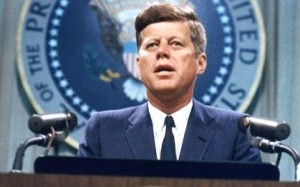
Note: With this article I am continuing the series I started last year under the working title of “JFK and the Road to Dallas”. All of the prior installments of this series are available to read in this blog site (fromanativeson.com) and can be found in the “Politics” category. The premise of the series is a simple one: that it is possible to determine what JFK would have done in Vietnam by examining his actions as President in the many crises he faced and handled prior to his assassination on November 22nd, 1963. There is a great deal of evidence that indicates that had he lived he would have ended U.S. military involvement in Vietnam and likely would have pursued, and in fact was pursuing, the end of the Cold War. Had he not been killed the situation in Vietnam would have never escalated as it did after his death and our nation would have been spared what instead became one of the most wasteful, divisive, destructive and heartbreaking periods of any in American history: the Vietnam War. To understand why Kennedy was killed and what has happened and continues to happen to our country since, it is important to understand something of the history of U.S. involvement in Vietnam. With that in mind, here is Part I of “Ramping up the Vietnam War.” MA
The involvement of the United States in Southeast Asia and specifically the country of Vietnam began much earlier than is generally realized by most Americans. By the time John F. Kennedy took office in 1961 the United States, chiefly through the machinations of the Central Intelligence Agency, had been involved directly in the internal affairs of what had become known as South Vietnam for nearly 7 years. Before this the U.S. supported the French government with materiel assistance in its war to re-establish Vietnam under its colonial control following World War II. Interrupted only by that World War (1941-45), during which Japan had assumed control of much of Southeast Asia, the French had dominated Vietnam for nearly a century. Well before World War II an indigenous independence movement, including armed resistance, had developed in Vietnam against the French; and when the Japanese supplanted the French at the outset of the war it continued against them.
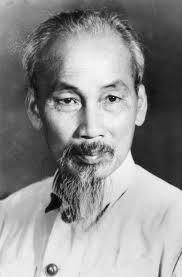
One of the leaders of this resistance was a man named Ho Chi Minh, a Vietnamese communist who had trained in both France and the Soviet Union and who, as well, had visited the United States, England and many of the countries of Asia outside of Vietnam. Ho returned to Vietnam from his travels in 1941and became a leader of the Viet Minh[1] army fighting for independence from France and, after the Japanese arrived, Japan. During their struggle against the Japanese Ho and the Viet Minh received funding from the United States as well as direct assistance from the U.S. war time O.S.S. (Office of Strategic Services)[2] in the form of small arms and medical assistance.
With the defeat of the Japanese in the late summer of 1945 the Viet Minh took control of Hanoi but their position was almost immediately compromised by the arrival of the British army in the southern part of the nation and the Nationalist Chinese under Chiang Kai-shek [3] in the northern part. At the Potsdam Conference, which was held in Germany in late July of 1945 and at which the leaders of England, the U.S. and the Soviet Union agreed on how the post war world would be managed, it was determined that Vietnam would be returned to the French. This was done in violation of the earlier Atlantic Charter in 1941 in which the Allies agreed on a non formal statement of their goals for the post war world. While not a binding treaty, the Charter nevertheless stipulated as one its principles that “all people had a right to self determination.” In handing Vietnam back to the French the Potsdam accords directly contravened this. They also directed that since France was not in a position at that point to return its full military to Vietnam, the country would be divided along the 16th parallel and that the Japanese surrender would be received by the British in the South and the Chiang Kai-shek’s Chinese in the North.
Reading the writing on the wall, on September 2 1945, the same day the Japanese formally surrendered, Ho Chi Minh and the Viet Minh issued the Vietnamese Declaration of Independence and announced the formation of “The Democratic Republic of Vietnam”. Ho reasoned that since the French, except for some of their administrators and some elements of their military that the Japanese had coerced into helping them, had abandoned Vietnam to Japan; and that since the Viet Minh had managed to wrest control of Vietnam from the Japanese; the French, therefore, had no legal right to the control of the nation. The Declaration of Independence adopted by the Vietnamese asserts this and borrows heavily from its American predecessor. Indeed, the first few lines are nearly identical and read as follows:
“All men are created equal; they are endowed by their Creator with certain unalienable Rights; among these are Life, Liberty, and the pursuit of Happiness.”
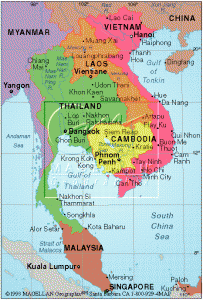
Like the American Declaration does with regard to the British, the Vietnamese version then goes on to chronicle the abuses the Vietnamese people had been subjected to at the hands of the French. It then closes with the following words:
“For these reasons, we, members of the Provisional Government, representing the whole Vietnamese people, declare that from now on we break off all relations of a colonial character with France; we repeal all the international obligation that France has so far subscribed to on behalf of Viet-Nam, and we abolish all the special rights the French have unlawfully acquired in our Fatherland.
The whole Vietnamese people, animated by a common purpose, are determined to fight to the bitter end against any attempt by the French colonialists to re-conquer their country.
We are convinced that the Allied nations, which at Teheran and San Francisco have acknowledged the principles of self-determination and equality of nations, will not refuse to acknowledge the independence of Viet-Nam.
A people who have courageously opposed French domination for more than eighty years, a people who have fought side by side with the Allies against the fascists during these last years, such a people must be free and independent.
For these reasons, we, members of the Provisional Government of the Democratic Republic of Viet-Nam, solemnly declare to the world that Viet-Nam has the right to be a free and independent country and in fact it is so already. The entire Vietnamese people are determined to mobilize all their physical and mental strength, to sacrifice their lives and property in order to safeguard their independence and liberty.”
From the Vietnamese Declaration it was clear that if the French tried to re-assume control of Vietnam they would have their hands full. As we shall see, that turned out to be the case.
Earlier in this article I made mention of the Atlantic Charter and the agreement that the World War II Allies would follow the principle of “self determination of peoples” as regards the post war world. This simply means that a people of a nation should be allowed to, and have a right to, choose their own form of government. The authors of the Vietnamese Declaration above refer to two other very important conferences. One of these is called “San Francisco” which refers to the conference at which the United Nations was established in the spring of 1945 and which took place in San Francisco, California. The principle of “self determination” was very much in the spirit of the Charter of the United Nations that was created at this conference and ultimately agreed to by the nations of the world. The second conference, which the Vietnamese Declaration refers to as “Teheran”, was a much less well known meeting that took place between the Allied leaders during World War II and at which the fate of the post war world was also discussed. The meeting, which took place in the city of Tehran in Iran and which was attended by Winston Churchill (England),[4] Franklin Roosevelt (United States), Joseph Stalin (USSR) is important because of the implications it had for the future of the colonial powers of Europe once the war was over. Two of these powers, of course, were France and England.
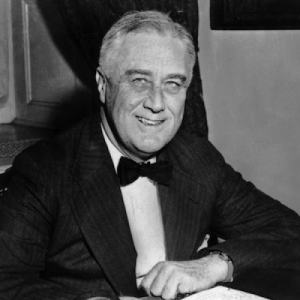
Before we discuss the Tehran conference in greater detail a little background information is in order on the subject of “colonialism”. In 1519 a Portuguese explorer who was working for the Spanish departed from Spain with 5 ships intending to cross the Atlantic Ocean in search of a westward route to the “spice islands”; part of what we today call Indonesia. This Portuguese explorer’s name was Ferdinand Magellan. Three years later, in 1522, one of Magellan’s ships, the Victoria, returned to Spain having completed the first known circumnavigation of the globe. Magellan himself did not make it back, having been killed in the Philippines during a fight with natives. In addition four of his five ships were lost as were 219 of the 237 men who left Spain with him on the journey. Nevertheless, the fact that the Victoria had successfully completed a trip around the planet was big news to the European countries of the day. It was now apparent to one and all that the Earth was, indeed, round; which in turn brought about the understanding that the horizon did not go on forever and that there was only so much land on the planet. Thus began the age of exploration and colonization by the seafaring nations of Europe, chiefly England, Spain, France, Portugal and Holland, as they set about claiming what they now realized was a finite amount of land.
Across the next three centuries these European nations vied with each other to claim their share of the planet, and while this may have resulted in vast riches for them, their presence in these distant lands was inevitably a disaster for the indigenous peoples already living there. It never seemed to occur to these Europeans during this age of discovery that the lands they were conquering had already been “discovered” generations earlier by these native peoples. The Europeans justified their actions in various ways as either bringing religion to the “heathen” natives or bringing “civilization” to them. In truth, however, they mostly just brought oppression and extermination to the people they conquered.
By the late 1700s most of the available land on the planet and been “discovered” and grabbed by these European powers, including vast parts of Africa, Asia and the Americas. In the case of the French and Vietnam their takeover was gradual, starting with Catholic missionaries arriving there in the 16th century and culminating in full economic subjugation in the latter half of the 1800s. By 1925 a bureaucracy of about 5,000 Frenchmen was ruling a population of about 30,000,000 people across French Indochina, the area that now includes Laos, Vietnam and Cambodia. As almost universally was the case with the colonial powers and the peoples they governed, the economic system imposed by the French on the Vietnamese was suppressive to the bulk of the people. In the late 1800’s a determination was made that French Indochina should become a greater source of revenue for France. To do this taxes were imposed in ways that ended up depriving many people of their land and their immediate source of sustenance. No longer able to support themselves many of the peasants were forced to take menial jobs growing rice for the French on land that used to be theirs, or working at other sub standard employment. One of the French actions taken during this time was to encourage the use of opium by the Vietnamese people, thus building up a populace of addicts at which point a tax was imposed on opium as another source of revenue. Needless to say such actions on the part of France were a sure way to foster discontent among the people and, as always will be the case in such situations, an independence movement took root in Vietnam as a result. If you take the time to read the full Vietnamese Declaration of Independence (easily found on the internet) you will see that it is very clear about these economic abuses carried out by the French.
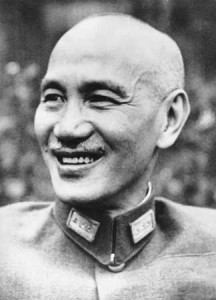
With that refresher on colonialism understood let us now have another look at the conference of the Allied powers that took place in Tehran in 1943 (Nov 28-Dec 2) during World War II. The Tehran conference is particularly important because during those talks the postwar future of Southeast Asia was discussed at some length. In his excellent book “JFK: The CIA, Vietnam and the Plot to Assassinate John F. Kennedy” author L. Fletcher Prouty[5]states that at the conference U.S. President Franklin Roosevelt proposed that French Indochina be placed under a trusteeship for the period immediately following the war. This, of course, meant that Vietnam and its neighbor countries would not be immediately handed back to France. As taken from Government Printing Office [6]publications and re-stated in Prouty’s book:
“At the Tehran Conference in 1943, Stalin and Chiang Kai-shek both approved Roosevelt’s proposal for a trusteeship for Indochina but Churchill was vehemently against the idea. Roosevelt said he told Churchill that Chiang Kai-shek did not want either to assume control over Indochina or to be given responsibility for administering a trusteeship in Indochina. / Churchill replied ‘Nonsense,’ to which Roosevelt retorted, ‘Winston, this is something which you are just not able to understand. You have four hundred years of acquisitive instinct in your blood and you just do not understand how a country might not want to acquire land somewhere if they can get it. A new period has opened in the world’s history, and you will have to adjust to it.’ ”
At Tehran it was clear to Roosevelt that Winston Churchill still very much believed in the right of the colonial powers to posses their colonies and he confronted the English Prime Minister on the issue. To Churchill it was inconceivable that anything would interfere with the return of England’s colonies after the war and he viewed Roosevelt’s views on the matter as a direct threat. If the French colonies could be placed under a trusteeship then what of the British colonies similarly affected by World War II?
In fact, a little over a year later during the Allied conference at Yalta[7] in February of 1945 the subject of trusteeships for the British, French and Dutch colonies was again raised. According to Prouty, Churchill “exploded” and launched into a tirade: “I absolutely disagree,” Churchill said. “I will not have one scrap of British territory flung into that arena…As long as every bit of land over which the British flag flies is to be brought back into the dock, I shall object as long as I live.” As you can see, the old English statesman had strong views on the subject.
At these conferences observing the conflict between Roosevelt and Churchill on the subject of colonialism was the Soviet leader Joseph Stalin. In his book Prouty makes mention of a very interesting incident that took place between Stalin and Franklin Roosevelt’s son Elliot a year or so after the war ended. The younger Roosevelt had been a Lt. Colonel in the Army Air Force during the war and had actually been in attendance at the invitation of his father during the Tehran conference in 1943. In 1946 Elliot Roosevelt visited Stalin for an interview. During the interview Stalin told him that when Elliot’s father, the President, had died in April of 1945 he had sent Soviet ambassador Andrei Gromyko to Elliot’s mother with a special request. As stated in Prouty’s book, according to Elliot Roosevelt this is what Stalin told him:
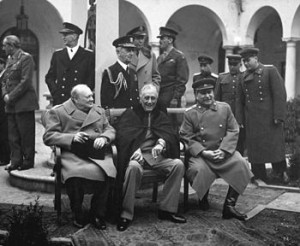
“When your father died, I sent my ambassador with a request that he be allowed to view the remains and report to me what he saw. Your mother refused. I have never forgiven her.”
“But why?” Elliot asked.
“They poisoned your father, of course,” Stalin replied, “just as they have tried repeatedly to poison me. Your mother would not allow my representative to see evidence of that. But I know. They poisoned him!”
“They? Who are they?” Elliot asked.
“The Churchill gang!” Stalin roared. “They poisoned your father and they continue to try and poison me. The Churchill gang!”
It is entirely possible that by 1946 Stalin had stepped off the edge of reality and was engaging in flights of paranoia when he made that statement to Elliot Roosevelt. It is a fact, however, that what had been a real bone of contention at Yalta in February of 1945, with Roosevelt on one side of the colonial issue and Churchill on the other, by the Potsdam conference in the summer of 1945 had been resolved in favor of just handing the Europeans their colonies back. In between was the death of Franklin Delano Roosevelt in April of 1945; and apparently dying with him was U.S. support for the concept of self determination for the long suppressed colonial peoples of French Indochina and other areas of the world.
This sudden policy shift by the U.S. calls to mind another such shift that occurred within a week after John Kennedy was assassinated in Dallas on November 22, 1963, the effect of which was to countermand JFK’s directives to ease the U.S. out of Vietnam. As a result, for the United States the Vietnam War would soon start for real—a war that became a tragedy this nation has yet to recover from.
To be continued…
Copyright © 2014
By Mark Arnold
All Rights Reserved
[1] The name “Viet Minh” is derived from “Viet Nam Doc Lap Dong Minh”, meaning literally “League for the Independence of Vietnam”
[2] The “Office of Strategic Services” (OSS) was formally created in 1942 and was modeled after the British Intelligence Agency MI-6. The purpose was to collect and analyze information required by the chiefs of the military branches and to carry out special operations not otherwise assigned. The OSS was the war time precursor of the CIA which was formally created by the National Security Act in 1947. Many who served in the OSS went on to serve in the CIA once it was formed.
[3] Chiang Kai-shek (1887-1975) was the leader of the Republic of China from 1928 until 1949 though much of that time he was fighting either Mao Tse Tung and the Chinese Communist Party in a civil war or the Japanese after they invaded China in 1937. His supporters were called “Nationalists” as contrasted with the Communists of Mao. In 1949 the Communists defeated Chiang and the Nationalists, whereupon they retreated to Taiwan and there established the Republic of China (also called Nationalist China or just Taiwan) under Chiang Kai-shek’s rule until he died in 1975.
[4] Winston Churchill (1874-1965) was Prime Minister of the United Kingdom from 1940-45 during World War II and again from 1951-55. An ardent advocate of the British Empire he is widely recognized as one of the greatest British statesmen ever for his leadership during World War II.
[5] Col. L. Fletcher Prouty (1917-2001) is the author of two books that are must reads to understand the role of the CIA during the Cold War and the Vietnam era. The books are “The Secret Team: The CIA and its Allies in Control of the United States and the World” and the book referenced in this blog, “JFK: The CIA, Vietnam and the Plot to Kill John F. Kennedy. Prouty was uniquely qualified to report on these subjects. A career Air Force officer who served as a pilot in World War II he was in the Pentagon from 1955 to 1964 where he served to coordinate military support for CIA covert operations around the world. Prouty himself was not part of the CIA and never took its security oath.
[6] The Government Printing Office (GPO) is part of the legislative branch of the U.S. government and is responsible for printing documents required by all parts of the federal government. The publication in this instance was “The US Government and the Vietnam War: 1945-1960” by William Conrad Gibbons. With regard to the Tehran Conference, in the quote from Gibbons’ book, which is used in Prouty’s book, it states that Chiang Kai-shek was present at the conference. Prouty also states he was there, having witnessed him fly there and also having flown Chiang’s delegation there from Cairo, where Chiang, Roosevelt and Churchill were meeting. Many historians dispute Chiang’s attendance at Tehran, citing a lack of supporting documentation.
[7] The “Yalta Conference” (Feb 4-11, 1945) held in Crimea was the second of 3 conferences by the Allied leaders (Roosevelt, Churchill and Stalin) during World War II. The first was at Tehran in 1943 and the third at Potsdam, Germany in the summer of 1945. By the time of the conference it was clear that the Germans would soon be defeated and its purpose was to plan for the re-establishment of the nations of war torn Europe.

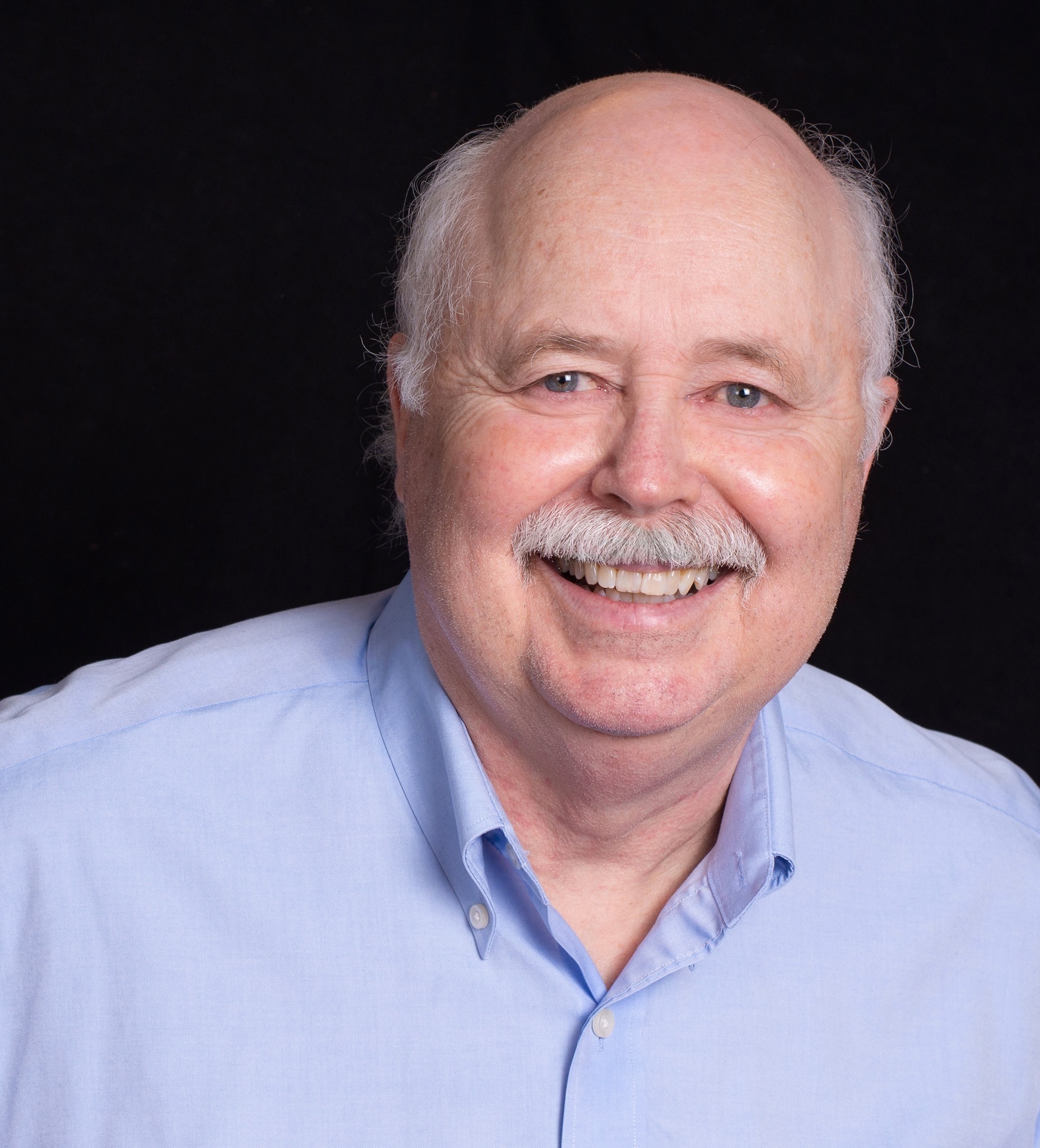
10 Responses
I think you will find that Prouty’s information is incorrect, either being taken out of context or simply fabricated. As far as I know, Southeast Asia was not discussed at Yalta, nor was Chiang Kai-Shek even present at Tehran, Yalta, or Potsdam. Roosevelt had two goals at Yalta: 1) to get Stalin to agree to the United Nations and 2) to get Stalin’s promise to enter the war against Japan. Stalin agree to both. Colonialism only came up during the Tehran conference and that was in the context of Roosevelt teasing Churchill. Prouty is not taken seriously by historians largely because of his claims which he backs up only with innuendo. And he once wrote an elaborate piece discussing his knowledge of a conference about continuing war called “The Report from Iron mountain.” He claimed he had knowledge of and inside information about the meetings and used this as his claim to credibility. But the Report was actually just a spoof written by writers of the Harvard Lampoon. Prouty’s credibility is nil, and he has no supporting documentation for his sometimes conflicting claims.
Also, there is nothing conclusive about JFK’s decisions about Vietnam. There are some claims about his signing a document to bring some advisors home before Christmas but that has been countered by the fact that those tours of duties were up and they were being replaced by others.
Hi John! Great to hear from you. I was very impressed with your article on the situation in the Crimea. Did you get a response from any of the people you sent it to?
As far as Fletcher Prouty goes, as to his credibility, I have read his entire series published in Freedom Magazine in the 1980s as well as “The Secret Team” and also the book that I reference in this article “JFK: The CIA, Vietnam and the Plot to Kill John F. Kennedy”. I also have read “Report From Iron Mountain” and have a copy in my library. I am aware he is a controversial figure in the eye’s of mor conventional historians. My first question to you is have you actually read Prouty’s books and Iron Mountain?
Second, Because of time right now, I have to get to work, I will address one point which you take issue with and on which you are basing some of Prouty’s suspected lack of credibility, and that is the statement you make that Chiang Kai-shek was not at Tehran. In his JFK book Prouty acknowledges that historians claim that he was not. Prouty, however, knows that he was because he personally flew Chiang’s delegation from Cairo to Tehran to attend the conference. Right before Tehran Roosevelt was meeting with the Chinese leader in Cairo and then they both continued on to Tehran. So we have a first hand eye witness in Prouty who states Chiang was there. Now, of course, this can be countered by simply stating that someone is lying or fabricating which descends into nothing more than a “yes you did–no you didn’t” type situation. I am not interested in that. I do not think Prouty is lying about it. Now, on the other hand, if what Prouty states about Chiang Kai-shek being in Tehran is true, then why would the more established historians lie about it?
All, I can do for now. Thanks for commenting, John! Good to be in comm again. L Mark
Arnoldian! Good stuff, as usual. My one question concerns the statement that the CIA became involved in Vietnam seven years before Kennedy took office, which would mean they were there in 1954. However, Prouty says on page 404 of The Secret Team the following: “Recall how the trouble in Vietnam started. The CIA had been involved in a great number of brushfire operations there for a number of years in one way or another since the OSS days of 1945.” Four pages earlier he writes: “Has it ever been properly explained why this country has retained an ambassador in Saigon since the first one was selected by the CIA to go to that new piece of real estate, a new nation called South Vietnam, back in 1954?” Maybe this is what you were referring to.
Pendleton
Pendleton!
Thanks! As the French were in Vietnam fighting the Viet Minh until ’54 I stated ’54 because it aligns with when they were defeated and when the US clearly came on the scene. I know the CIA was in there before that doing who knows what but did not have the specifics to hand so left it at ’54. I know the OSS was there in ’45 with Hoh and through the war but don’t know for how long after the war, or when the CIA actually first went in there after they were created. Stuff yet to find out.
More to come soon!
Arnoldian
Mark,
Thanks for the reply. I haven’t heard anything back from the Crimea letters yet.
I read Prouty’s articles in Freedom magazine and I read The Report from Iron Mountain and the articles that revealed it was a hoax.
Prouty is not a controversial figure for convential historians. They simply ignore him. One can see why people who claim to be historians like Prouty are ignored simply by his claim that Chiang was at Tehran. There is no evidence that Chiang was at Tehran. Chiang was at the Cairo conference and met with Roosevelt and Churchill on their way to Tehran. The Cairo conference and Chiang is mentioned in the memoirs of Averill Harriman, Chip Bolen, in Sherwood’s book Hopkins and Roosevelt, and in Churchill’s World War II writings. Not to mention others.
Prouty invalidates himself in that his only claim that Chiang was there is his “Because I said so.” There is no evidence. that he was there. Prouty is of a conspiratorial mindset, instead of an historical investigation. conspiracy theories are prescriptive and proscriptive; they prescribe no proof as proof of a conspiracy and thereby proscribe any factual evidence. Per Prouty’s reasoning if he had said “I flew Batman and Chiang to Tehran” that would prove that Batman was real and was there.
Historians are not in the business of disproving a negative. The burden of proof is on Prouty to prove that Chiang was there. I’m pretty sure that there are good biographies about Chiang which show evidence of where he was after the Cairo Conference. Madame Chiang has written a biography, I think. I know she was a Cairo because Churchill mentions having dinner with her.
And it isn’t just memoirs or single statements that prove history. There are other diaries, letters, and other primary evidences that historians use. And after taking everything they can find into account, then historians make their claim. They don’t do as Prouty does and make a conspiratiorial claim and then cherry-pick information, isolated statements taken out of context, make insinuations, and interprets all that through the eyes of a conspiracy. This is what Prouty does.
He is not a controversial historian, he is simply invalid.
If you want to understand what happened to Kennedy don’t research it with a bias approach. And Prouty is very biased.
John Ruane
Hi John,
Thanks for your information and it has prompted me to look deeper. I am editing the article to show that the attendance of Chiang at Tehran is a disputed point. I think it is possible he was there but not in the capacity of conference attendee, or possibly he was there. stayed a few days and and moved on. I acknowledge that historians say he was not there.
That said, to say there is no evidence he was there is to discount eye witness testimony that he was, at least by one witness, Fletcher Prouty. This gets to a point that has bothered me for a while. I did not conclude that Kennedy was killed by a conspiracy initially and then start looking at history to corroborate that. When I started looking at the Kennedy assassination I looked at eyewitness testimony of ordinary people who saw things and heard things with their own eyes and ears. I looked at the Zapruder film and applied common sense to it. I read what the trauma room Drs. at Parkland had to say about the nature of JFK’s wounds. This was all back in the ’80s when I was initially looking into it. I concluded then that JFK was killed by a conspiracy and that the Warren Commission was a fiction. I haven’t checked any standard histories about it lately, but I did back then and they were reporting as history that Oswald did it all by his lonesome, something that is patently false. If the true history of something shows that a conspiracy existed, then it existed. If the true history shows it didn’t, then it didn’t. To label some thing as not valid because it has a conspiratorial view or explanation is as not valid as the “cherry picking” of facts to support one’s view that you refer to.
The view you are operating from, accepted as fact, would force one to conclude that Prouty is at best a revisionist and at worst a liar and given to delusion. I don’t believe that, from what I have seen and come to know of the man. I believe he was an honorable man, who was in a position to see up close and personal and observe with his own eyes and ears and had the fortitude to say what he observed. Because of what he did for the bulk of his career, he had more first hand knowledge of cold war events than any historian I am aware of.
I truly appreciate your views John, and welcome your input.
Thanks!
Mark
Thanks. I am not saying that Prouty is not an honorable man; I’m saying he is a very bad historian. His saying that he flew Chiang to Tehran has to be confirmed, otherwise history is anything people wish to say it is.
As far as the Kennedy assassination, it is clear by looking at the phone calls that both LBJ and Bobby Kennedy thought it was Castro. Even the senior investigator for the Church committee testified in congress years later that he suspected a man named Hernandez who the CIA had sent into Cuba to kill Castro. He was never seen or heard of again except for a report that said he was seen in Dallas the week Kennedy was killed. There had to be a cover-up of the evidence leading to Castro, otherwise it could easily lead to World War III. All of this is pure speculation on my part. But any investigation into the Kennedy’s death will be speculation, and that is bad enough. But to tie the Kennedy assassination into the Vietnam War is going way over the line. A study of the events of Vietnam clearly shows that the U;S. made the same mistakes that other countries make going back to the Peloponnesian War.
John Ruane
Thanks John, and I duplicate you.The reason I used the word “honorable” with reference to Prouty is because in your first comment at the very beginning it seems that you are saying that you think Prouty possibly “fabricated” data and called it history. To me, if Prouty did that, he would be dishonorable. If that isn’t what you are saying, then I understand your point about him being a bad historian better, though I do not agree because I don’t think Prouty considers himself an historian in the Academic sense, just my opinion. I have never heard or read of him saying that. He is a guy who was in a position to directly witness some of the momentous events of the twentieth century and the Cold War and is reporting on what he saw and what he thinks the implications might be. What academic historians do with his data is up to them. I would hope that some of them would be challenged enough to do more and deeper investigations as a result.
As far as the JFK killing goes, from what you said it sounds like you are, if not in outright agreement, at least inclined to believe that JFK was killed as a result of a conspiracy. To me your speculation about Castro killing Kennedy seems to indicate that. Is that correct?
As far as what Robert Kennedy and Lyndon Johnson thought about who did it, and since we are speculating; despite what they may have said in the first few weeks after the assassination, I don’t believe either of them believed that Castro had anything to do with it. A more plausible (to me) idea of what at least RFK thought can be found in a book written by James Douglas entitled “JFK and the Unspeakable: Why He Died and Why it Matters”. On page 380 of this book Douglas refers to a man named William Walton who was a personal long time friend of both RFK and JFK. In December of ’63 Walton, who was an artist, left to visit the Soviet Union on a trip planned for him by JFK when he was still alive. The original purpose of the trip was to foster relations with Soviet artists. RFK used Walton’s trip to convey a message to the Soviets, the substance of which was recorded and placed in top secret Soviet intelligence archives, whereupon it was discovered 34 years later by two researchers, Aleksandr Fursenko and Timothy Naftali, who wrote about it in 1997 in a book about the Cuban Missile Crisis entitled “One Hell of a Gamble” According to Fursenko and Naftali, as recorded in the Soviet docs, Walton relayed to the Soviets at RFK’s request that RFK believed his brother was killed by domestic opponents involved in a right wing conspiracy.
Since you opened the door for speculation I thought I’d throw my two cents worth in.
In the next few articles I am writing I will be crossing “way over the line” as you say, and make the case that JFK was going to pull the plug on Vietnam, and more than that, the Cold War itself.
As always I welcome your input on anything I publish. I admire your intellect and knowledge, though we may disagree on some things.
Mark
You know this is the same in any other field.
You’d think past teaches us anything, but that’s so rare.
Hate all you want but the world changes rapidly, and none of us have no control whatsoever over it.
For instance, If only Barack had enough balls to put Putin to his place, but it seems like it’s not happening, welcome WW3.
A profound post, thanks!
You are welcome Sarah and thanks for your input. I understand your sentiments completely, but don’t lose hope. Sometimes the world changes slowly, but it can change. Best, mark